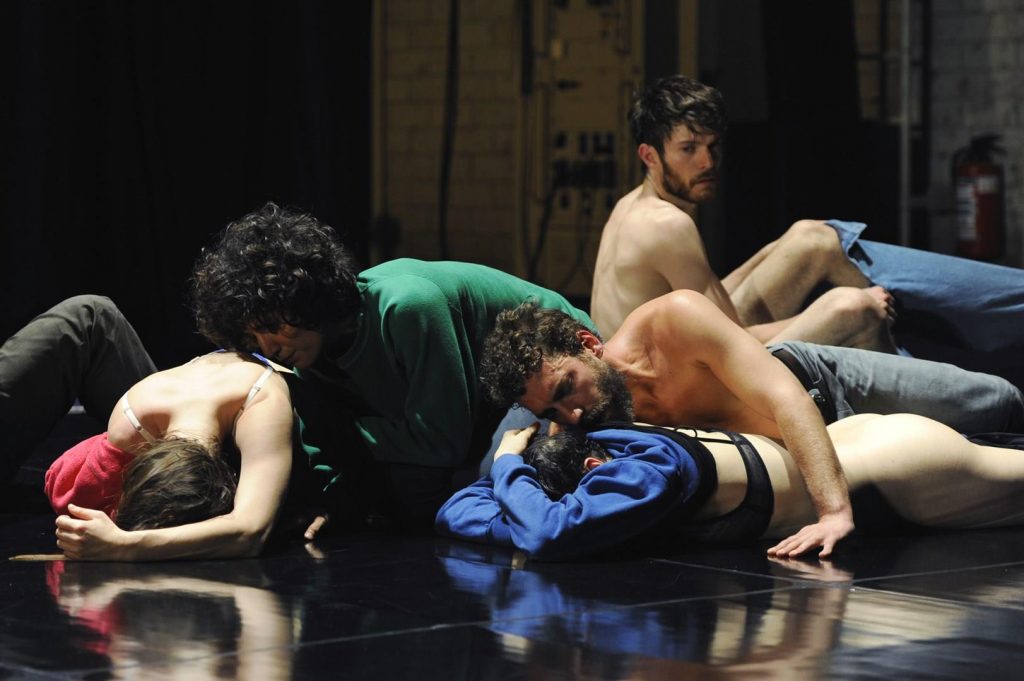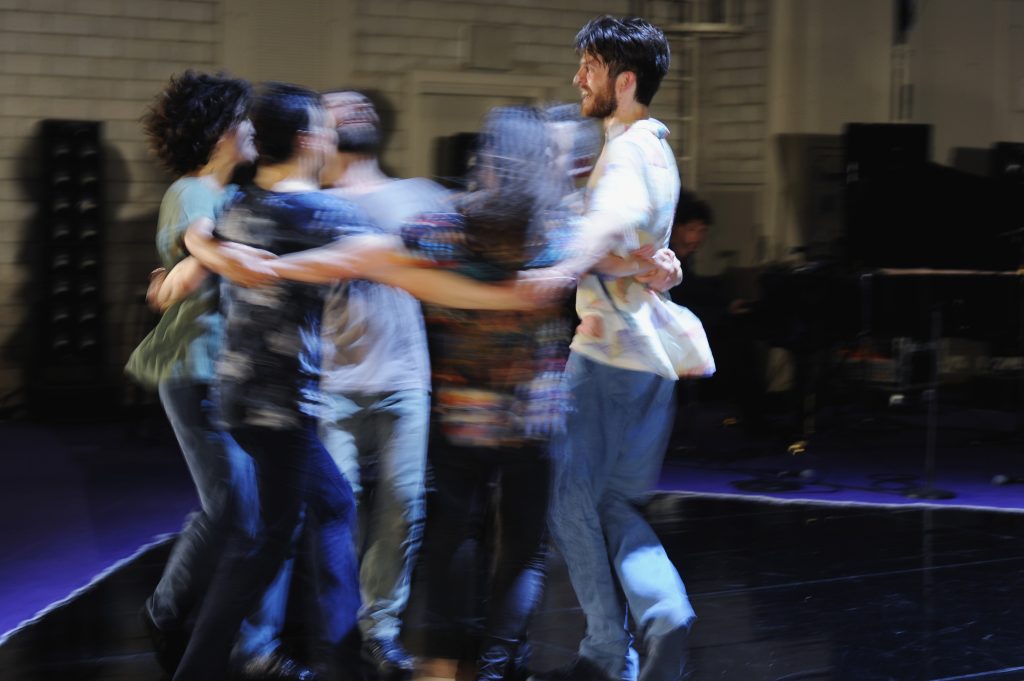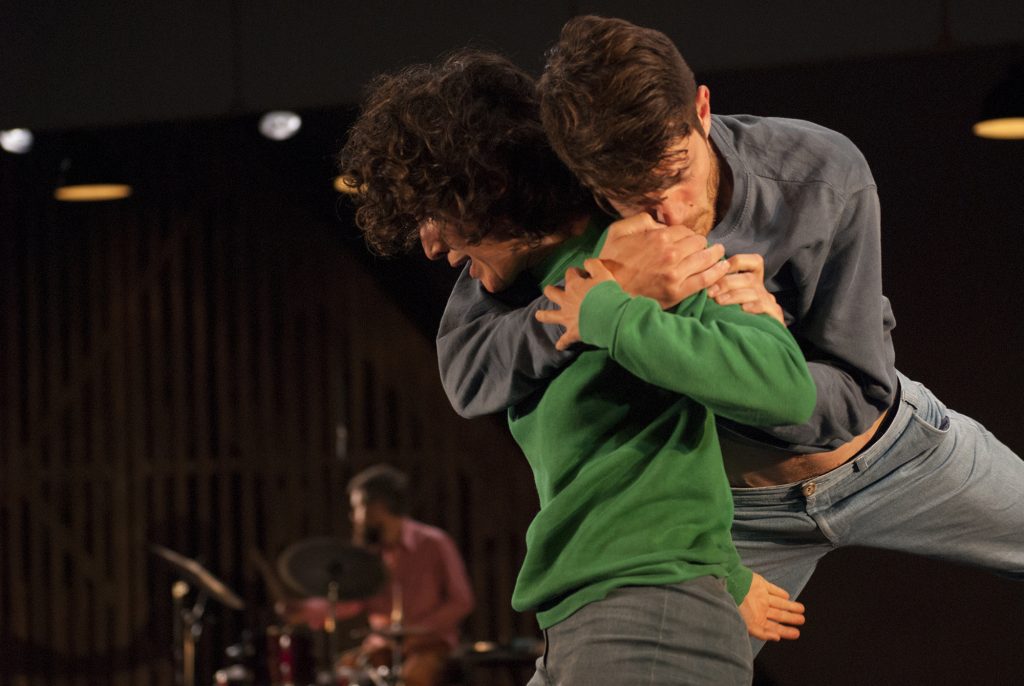Het twee uur durende heldenepos Until Our Hearts Stop van Meg Stuart, dat deze week in de Rotterdamse Schouwburg te zien is, doet niet aan een dramatische opbouw volgens de regels van de Poetica van Aristoteles. We weten niet wie die mensen zijn daar op het toneel. Ze lijken ook geen speciale opdracht meegekregen te hebben, al worden ze duidelijk gedreven door verlangen naar lichamelijk contact. De paarse vloerbedekking, de bank en het enorme, wonderlijke plafond herinneren aan lobby’s zoals je die tegenkomt in veel hedendaagse grote gebouwen: schouwburgen, kantoren, hotels, luchthavens. Van die plekken waar je niet dood gevonden wil worden, maar waar we ondertussen wel erg veel tijd doorbrengen, hangend of winkelend, op weg naar werk of vakantie-bestemming.
Maar gelukkig is er een band en die speelt weergaloos. Trompet en piano, drums en bas vullen het ‘binnenplein’ met ambient sferen, opzwepende en gebroken ritmes, van gezellig jazzy tot ontregelende chaos en uitgekiende stilte. De performers proberen een plek te vinden in de transit-wereld van de lobby. Stuart laat hen oefenen met omgangsvormen. De seksuele onderstroom, die zoals internet-gebruik bewijst ons allen het meest beheerst, duikt al snel op en uitbundig worden lichamen besnuffeld en bepoteld.

Lichte gène
In plaats van sexy lady’s op hoge hakken en mannen met opgepompte spierbundels, gooit Stuart hele gewone lichamen in de strijd. Het levert een collage van gestes en handelingen op die soms wat expliciet wordt, maar nooit werkelijk voorbij de suggestie gaat. Een weergaloos gemonteerde stapeling van menselijke gebaren, die losgezongen van hun gebruikelijke context niet alleen lichte gène voortbrengen, maar vooral ook hilariteit en ontroering. Een esthetiek van woordeloze en terloopse gebaren, tussen voorbijgangers en kennissen, of misschien ook wel intimi. In de stapeling van beweging en stilstand, lichamen en stemmen, licht en donker, naaktheid en met de kleren aan, grootse beelden en absurde details, worden lichamen, gevoelens en gedachten voorzichtig opnieuw aan elkaar geknoopt.
Het gezelschapsspel van Until Our Hearts Stop tekent mooi de aandachtsmachine uit, waarin ons leven via sociale media vorm krijgt. Entertainment beheerst de politiek, de sterkste mag weer boven liggen en als een vijfjarige jongen om zijn gelijk schreeuwen. In die wereld toont Until Our Hearts Stop de achterkant van dat gelijk, ondermijnt de rethorica van boude uitspraken en snelle plaatjes, transformeert pussy grabbing van een hobby van misogyne mannen naar een vraag over hoe verlangen ons samenzijn bepaalt.

Klunzigheid
Uitsluiting en isolatie, de wereld bekijken vanuit het perspectief van underdogs, loosers en anti-helden, het is een terugkerende thema in het werk van Meg Stuart. In eerdere voorstellingen werd de isolatie van de protagonisten soms zo ver doorgezet, dat je je als toeschouwer afvroeg waarom je er nog bij zat én bij bleef. De afgelopen jaren heeft Stuart een aantal meer toegankelijke voorstellingen gemaakt, waaronder projecten met de Münchener Kammerspiele / Johan Simons. Until Our Hearts Stop is er daar één van. Maar ook Sketches/Notebook en Hunter vertonen deze tekenen. (Zie interview met Stuart n.a.v. Holland Festival dit jaar).
Het radikaal esthetische duikt onder en de concreetheid van groepsprocessen, samenspel, onderlinge aanraking en het verkennen van de grenzen in het openbare treedt naar de voorgrond. Dansers beginnen te zingen, acteurs beginnen te dansen, en ook de drummer zit een ogenblik naakt achter zijn stel. Niemand kan zich terugtrekken op de zekere grond van virtuositeit en technische beheersing. Existentiële vragen worden verbonden niet alleen met rebellie en verzet, maar uitdrukkelijk ook met samenspel. Het publiek wordt direct aangesproken en soms verleid tot een beetje meedoen. Knikkers over de vloer rollen of een slok wisky aannemen, het kan je de kop niet kosten. Onderwijl arrangeert Stuart verlegenheid en klunzigheid in de omgang tot een virtuoos spel van vallen en opstaan, van tijd nemen en uitbreken.

De twee uur vliegen voorbij, ondanks de enorme gaten die er vallen. Until Our Hearts Stop doet denken aan het getroebleerde optimisme van Achterberg’s “geheel den dag hebt gij mij gaande gehouden, dood, draaiend in mij”. Gefnuikt verlangen en vrolijk spel, cynisme en volle overgave laten in hun afwisseling enorm veel ruimte voor toeschouwers om te kijken, en dat kijken nog een te bekijken.
Wat is er zo moeilijk aan het menselijke, al te menselijke verlangen? Waarom steken wij onze hand zo moeilijk uit naar een ander? Die vraag wordt niet beantwoord. In de lobby zijn de schilderijen van de wand gehaald en is er weinig ruimte voor triomfantelijkheid. Maar in Until Our Hearts Stop ligt het speelveld tenminste open.
Meg Stuart in video-doc over Until Our Hearts Stop hierboven: “We are social animals, we need social social contact, we need this constructed possibilities of play, and if we didn’t have it as children we need to keep having it as adults, we need to witness that, because it keeps us going and it lifts us up, and sometimes i think there is not enough willingness to be silly and creative, there is not enough trust in the room, like social relationships are build on protocols or almost fear, it feels there is a lot of limits i think, and people don’t even know where they’re coming from, and most of the time in social relations people are just negotiating their limits, like how far close are we next to each other, how do we answer our emails, it’s all about a game of borders, instead of just like ‘okay, lets trust, lets say what we want to and if we don’t feel like it also not – i don’t know, i would like to, people to meet differently, even strangers ..”
